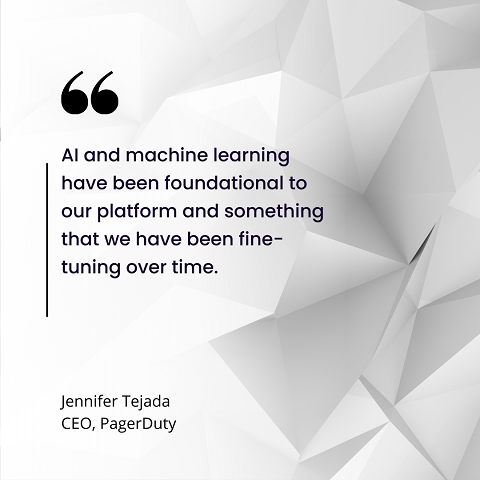PagerDuty Advances Intelligent Operations Platform
PagerDuty is increasingly leaning on AI to help power new services that help IT operations be more efficient.

PagerDuty got its start largely as an incident response platform helping IT staff.
On the company's recent earnings call for the first quarter of fiscal 2025, CEO Jennifer Tejada outlined how PagerDuty is evolving beyond its roots in incident response into a multi-product Operations Cloud. It's an approach that is already yielding some strong results. For the quarter, the company reported revenue of $111.2 million, up 7.7% year-over-year.
"Our platform enables enterprises to modernize their business and technology processes and culture, standardize automation practices, transform incident management, and automate operations," she said.
AI-Powered Incident Management
A key part of the company's expansion is its new enterprise incident management offering that integrates artificial intelligence capabilities.

"In March, we introduced a new enterprise plan for incident management," Tejada said. "This solution incorporates our market-leading Incident Response offering, select AIOps features, and Jeli's opportunity analysis and deep Slack integration into a single end-to-end offering."
PagerDuty acquired incident management vendor Jeli in November 2023 and now has largely integrated the technology into its stack. Tejada explained that the Jeli technology allows users to assess previous incidents and apply those insights to improve future response efforts.
Advancing AIOps Capabilities
PagerDuty has been steadily advancing its AIOps product, leveraging machine learning models trained on the billions of events that flow through its platform annually.
"AI and machine learning have been foundational to our platform and something that we have been fine-tuning over time," Tejada said.
The latest AIOps enhancements provide unified visibility across incidents through a new operations console. Tejada said PagerDuty's AIOps product can now serve as a single source of the truth for newly created incidents and provides a live shared view of operational health.
Beyond just surfacing incidents, PagerDuty's AIOps is becoming more adept at filtering out noise.
"We delivered additional enhancements to AIOps to better distill signals automatically from the ever-increasing volume of event noise," Tejada stated.
Expanding Automation Use Cases
Another core focus area is PagerDuty's automation capabilities, which aim to standardize workflow automation across an enterprise's technology stack.
"PagerDuty Automation gives customers a common flexible framework for automating across systems and teams," Tejada said. "Our offering spans the full breadth of pro-code to no-code workflow automation to drive wider adoption and improve the return on investment on existing automation investments."
The goal is to help customers automate more manual processes while reducing reliance on third-party services. According to Tejada, one logistics customer was able to deliver an ROI of 175% in a single year using the platform.
Enabling Generative AI Use Cases
Looking ahead, PagerDuty is working to integrate generative AI capabilities to further automate operations workflows.
The upcoming AI assistant aims to reduce toil and contextual switching for responders by automatically summarizing all pertinent incident data. It will be available later this summer on a consumption-based pricing model.
"Our newest use case, helping responders or executives come up to speed during a major incident, leverages AI-assisted auto summarization, utilizing a simple Catch Me Up prompt," Tejada said. "This saves companies significant labor cost by summarizing incident details, messages, attempted automations, and customer impact in a moment."
About the Author(s)
You May Also Like




